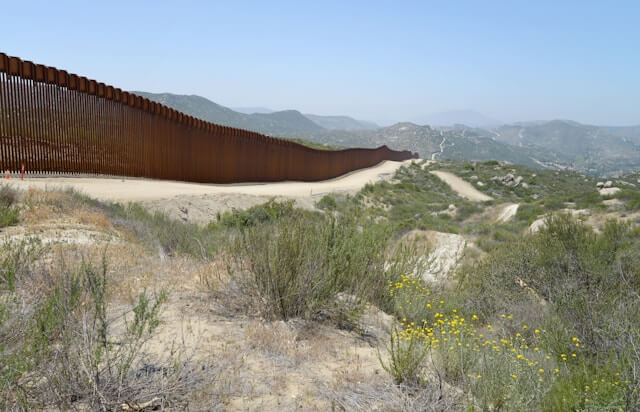Holding Democrats Liable for Border Crime
Holding Democrats Liable for Border Crime. Democratic-led federal and state policies have coincided with a substantial rise in illegal border crossings, culminating in nearly 2.9 million nationwide encounters in fiscal year 2024 alone, up by nearly 50% compared to the period from 2017–2020. Many of these policies—such as the democrat’s disastrous rescission of “Remain in Mexico,” expanded parole authority, and catch‑and‑release practices—have been criticized for incentivizing mass migration and straining local resources
Tragically, too many illegal aliens entering without authorization have committed violent crimes on U.S. soil, including the high‑profile murder of nursing student Laken Riley by an undocumented migrant, José Antonio Ibarra, in February 2024. As a recourse, the U.S. Justice Department under a Republican administration has already filed suit against blue jurisdictions—New York and Illinois—for sanctuary policies that impede federal immigration enforcement. Parallel civil actions by victims and state attorneys general against Democratic officials and sanctuary cities could impose financial accountability, deter lax policies, and pressure lawmakers to restore secure borders.
Biden and Harris Help Known Terrorists Across Southern Border And Ordered Officials To Keep Quiet
The Border Crisis: Scale and Trends
Since President Biden took office, U.S. Customs and Border Protection (CBP) has logged explosive increases in encounters with noncitizens attempting to cross without authorization, reaching 8.72 million at the Southwest border and 10.8 million nationwide since FY 2021. In fiscal year 2024 alone, CBP recorded approximately 2.9 million inadmissible encounters, nearly matching the total for the prior four years combined, and registered roughly 2 million “gotaways” who evaded detection.
Migrant flows have been driven by regional instability, cartel violence, and economic desperation in Latin America, but critics argue that U.S. policy choices—including executive actions expanding humanitarian parole—have compounded the problem by offering de facto amnesty to large cohorts of migrants. Blue‑state and blue‑city sanctuary directives, which limit cooperation with federal immigration authorities, further complicate apprehension and removal efforts, creating deconfliction zones where unauthorized migrants may reside with reduced risk of federal detention.
Democratic Policies and Accountability
Key policy decisions by former President Biden and congressional Democrats have drawn scrutiny for their perceived role in facilitating unchecked migration. The rescission of the Migrant Protection Protocols (“Remain in Mexico”) in June 2021 removed a crucial deterrent, allowing asylum‑seekers to await hearings within the U.S. rather than in Mexican border camps.
In early 2023, the administration instituted an expansive parole program for nationals of Cuba, Haiti, Nicaragua, and Venezuela, authorizing hundreds of thousands of migrants to enter lawfully but sidestepping traditional asylum channels, which critics say undermined deterrence. Concurrently, catch‑and‑release practices—whereby migrants without credible fear are released into the country with notices to appear—have seen high failure‑to‑appear rates, estimated at over 50% in some groups.
“As one user on X put it, ‘No parent should bury a child because of failed Socialist Democrat policies.’
At the state level, Democratic governors and mayors in California, New York, Illinois, and elsewhere have enacted sanctuary policies shielding unauthorized migrants from detention or notification to ICE, citing humanitarian and public‑safety rationales. However, these policies have drawn lawsuits from the U.S. Department of Justice alleging violations of the Supremacy Clause, arguing that such laws “obstruct federal immigration enforcement” and endanger public safety.
Human Cost: Injury and Loss of Life
Although some illegal aliens contribute positively to the economy—filling essential roles in agriculture, construction, and services—too many commit violent crimes with tragic consequences. On February 22, 2024, 22‑year‑old nursing student Laken Riley was abducted and brutally murdered by an undocumented Venezuelan migrant who had crossed the border illegally and evaded prior detainers, spurring nationwide outrage. This case led Congress to pass the Laken Riley Act, mandating mandatory detention of unauthorized migrants arrested for burglary or theft and empowering state attorneys general to sue the federal government for enforcement failures.
Other victims have similarly sought redress. In 2015, the family of Kate Steinle filed a wrongful‑death lawsuit against San Francisco over its sanctuary‑city policy after an undocumented immigrant killed her on Pier 14, arguing that the city’s refusal to honor ICE detainers “made her death foreseeable and preventable”. The Jamiel Shaw II case in 2008 prompted his family to sue Los Angeles County and the sheriff’s department for negligence in releasing an alien gang member, though the courts ultimately dismissed the suits on immunity grounds.
Civil Lawsuits as a Tool for Reform
Victims’ families, state attorneys general, and private citizens can leverage civil litigation to enforce accountability and shape policy. The DOJ’s federal lawsuits against New York (filed February 12, 2025) and Illinois (filed February 6, 2025) challenge sanctuary statutes that “impede federal authorities,” naming governors, attorneys general, and local officials as defendants. Similarly, wrongful‑death and negligence lawsuits against sanctuary cities could compel these jurisdictions to reconsider policies that prioritize noncitizens over citizen safety.
At the individual level, plaintiffs could allege negligent entrustment or governmental tort liability, asserting that Democratic officials “knew or should have known” that lax enforcement would lead to harm but failed to act. Awards of compensatory and punitive damages, combined with injunctive relief, could force policy reversals—especially in financially strapped municipalities fearful of massive liability.
Potential to Reverse the Trend
Civil suits against blue‑state and blue‑city leaders have the potential to recalibrate incentives. Facing crippling legal costs, local governments may withdraw sanctuary policies, increase coordination with ICE detainers, and advocate for stricter federal asylum rules. At the federal level, successful DOJ lawsuits could establish precedent limiting state and local autonomy over immigration enforcement, empowering CBP and ICE to detain more migrants post‑arrest.
Moreover, high‑profile verdicts in favor of victims’ families would signal to Democratic lawmakers that immune sanctuary frameworks carry real political and financial risk. This pressure may prompt bipartisan agreement on comprehensive immigration reform—linking robust border security measures with streamlined legal pathways to status—to prevent future tragedies and restore public confidence.
Holding Democrats Liable for Border Crime
Conclusion: The surge in unauthorized crossings under Democratic‑sponsored policies has had tangible, sometimes lethal, repercussions for U.S. citizens. By utilizing civil litigation—through DOJ suits against sanctuary jurisdictions and wrongful‑death and negligence claims against local officials—victims and states can drive accountability, alter policy incentives, and ultimately stem the tide of unauthorized migration. Civil lawsuits offer a pragmatic avenue to compel policy reversals, safeguard communities, and honor the memory of those whose lives were senselessly cut short.




